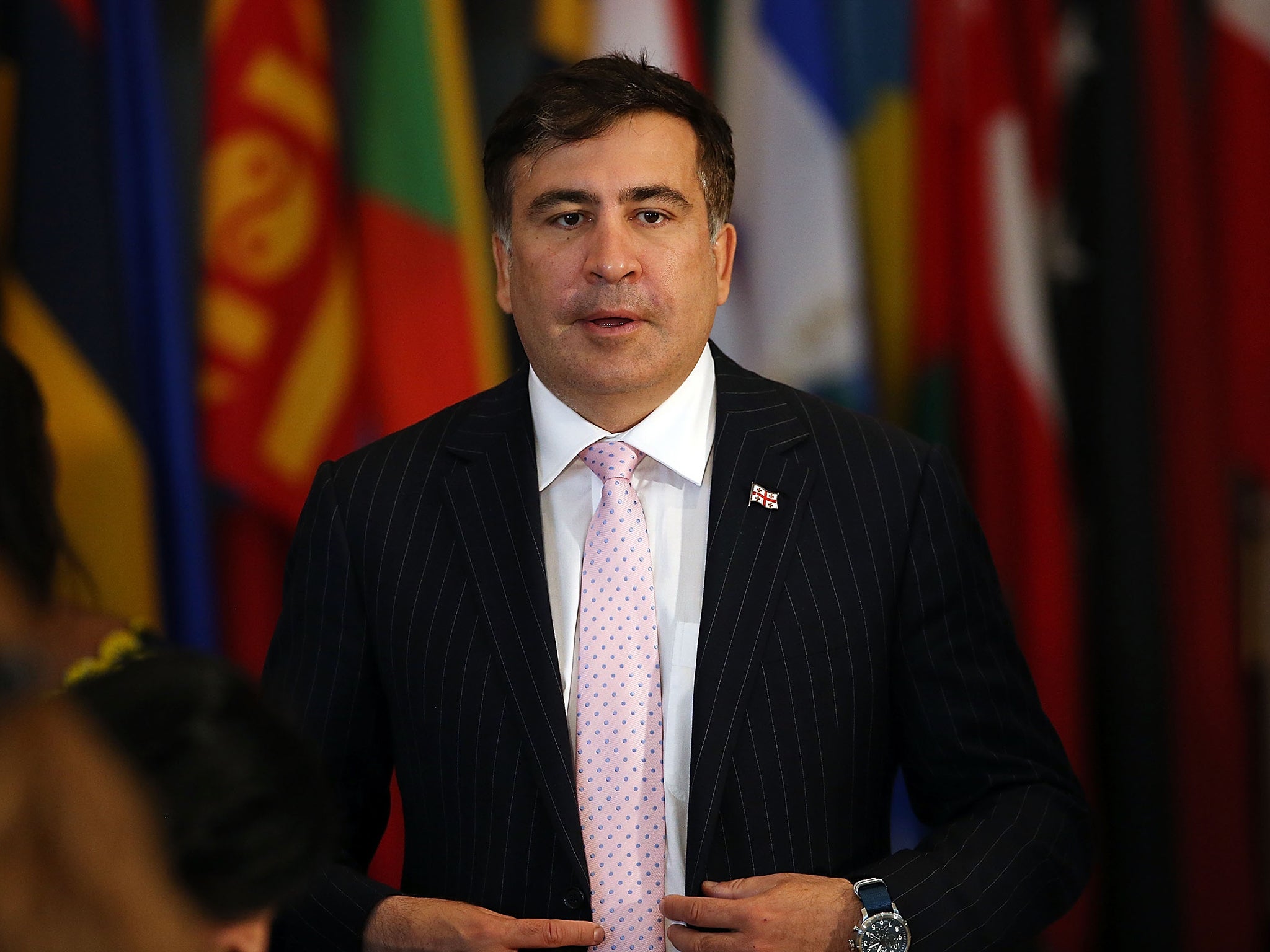Georgian leader’s appointment makes Ukraine personal for Vladimir Putin
As Crimea has shown, Mr Putin is no more averse than George Bush was to taking aggressive military action to suit his purpose

“I discussed this personally with Putin a while ago. I said: ‘Vladimir Vladimirovich, the payback for your country for supporting separatists would be that violence would come back to hit you as well.’ Putin said: ‘If anyone tries anything against us, we shall crush them like cockroaches.’”
Mikheil Saakashvili, the then President of Georgia, was describing his conversation with the Russian leader when I interviewed him four years ago. It took place soon after suicide bombings at Moscow’s Domodedovo airport, carried out in revenge, it was claimed, for the Kremlin’s military operations in the Caucasus.
I had gone to Tbilisi straight from covering the fall of President Zine el-Abedine Ben Ali in Tunisia, in what was the start of the Arab Spring, although we were not to know that at the time. Mr Saakashvili said that what happened in Tunisia was of transitory interest. The real problem, he wanted to stress, would lie with Russia in eastern Europe. So, he was half right in his analysis.
When The Independent published the exchange from the interview, panicked phone calls ensued from officials in Tbilisi, fearful that it would provoke Mr Putin. I had to point out that he and Mr Saakashvili had been regularly trading insults with each other, before, during and after the 2008 war between their countries.
Mr Saakashvilli, for instance, had accused the Russian President of being akin to a “crocodile ready to swallow you up”. Mr Putin had confided to a visiting Nicolas Sarkozy of his intention to “hang Saakashvili by his balls”. It was not, obviously, a relationship based on friendship and trust.
I was in Libya last week, reporting on another chapter of the unfolding Arab Winter, when news came that Mr Saakashvili has been made governor of Odessa by Ukrainian President Pietro Poroshenko. The official reason for the appointment was that Mr Saakashvili was a strong leader who had instituted widespread reforms and brought in measures to counter corruption in Georgia. He had also faced Russian aggression first hand, an experience which, Kiev said, would be valuable in protecting a region under pressure from Russian-backed separatists.
Unofficially, President Poroshenko was also seeking to further curb the powers of the oligarch Ihor Kolomoisky. The billionaire had bankrolled one of the largest private armies fighting the Moscow-backed rebels in the Donbas and had become over-mighty, the Ukrainian President had come to believe, in the turbulent political landscape following last year’s revolution.
President Poroshenko removed Mr Kolomoisky from the governorship of the Dnipropetrovsk region two months ago and Mr Saakashvili replaces an ally of the oligarch in Odessa. Running the region, however, will not be an easy affair, Ukrainian observers point out, with vested interests and organised crime determined to protect their turf.
The vital issue, internationally, is Moscow’s reaction to the coming of Mr Saakashvili. Odessa was far from the front line in last year’s war, but it was the place where one of the worst acts of violence took place, leaving 48 people burned to death and more than 200 injured. The victims were pro-Russians trapped in the local trade union headquarters; their killers throwing Molotov cocktails were right-wing nationalists.
I arrived in the aftermath to find the beautiful city on the Black Sea, which prided itself on its multi-cultural heritage, simmering with bitterness and tension. There has been a series of attacks since then, five bombings in December alone, targeting transport points, nationalist groups, and a collection point for the Ukrainian army. One man died when the bomb he was carrying exploded prematurely.
What will be the effect of Mr Saakashvili’s introduction into this incendiary scene? Dmitry Medvedev tweeted on hearing the news: “The circus continues.” Mr Saakashvili riposted that the Russian Prime Minister’s reaction was “hysterical”. Kremlin-backed media outlets have been claiming that the former Georgian leader is likely to try orchestrate the “provocations” which led to the 2008 war.
Exactly who started the conflict in which Russian forces went into South Ossetia and Abkhazia, removing them from Georgian suzerainty, remains unclear. To the few of us who went into Tskhinvali, the Ossetian capital, there were signs that the Georgians had carried out an attack, but also that they had been manoeuvred into doing so by the Kremlin. Mr Saakashvili had gone to great lengths to court the US as an insurance policy against Russia, and had expected American support when the conflict began. But when journalists drove into Tbilisi along the “George W Bush Boulevard”, members of the US military and private security contractors who had been training the Georgian army were heading the other way.
Mr Putin’s desire to suspend Mr Saakashvili by the testicles had come, if indeed the account of those present at the meeting with Mr Sarkozy are to be believed. When Mr Sarkozy protested, the Russian President is said to have pointed out, “didn’t the Americans hang Saddam Hussein?” The French President asked: “Do you really want to end up like Bush?” Mr Putin acknowledged: “You have a point there.” As Crimea and the Donbas has shown, Mr Putin is no more averse than Mr Bush was to taking aggressive military action to suit his purpose. Whether the presence of Mr Saakashvili plays a part in him attempting to swallow Odessa “like a crocodile” remains to be seen. But what is clear is that a new, and very personal, dimension has been added to the Ukraine conflict.
Subscribe to Independent Premium to bookmark this article
Want to bookmark your favourite articles and stories to read or reference later? Start your Independent Premium subscription today.

Join our commenting forum
Join thought-provoking conversations, follow other Independent readers and see their replies